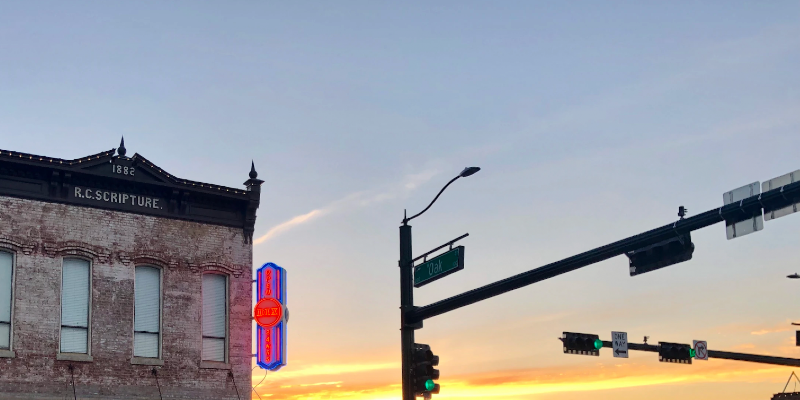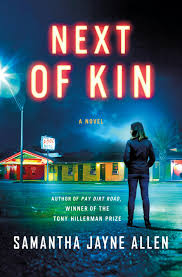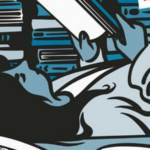The phrase “people often ask me” sounds like a setup here, but it’s true that people often ask me why it is I’ve chosen to write about small-town Texas. And every time, the question sort of takes me aback—not because it’s an unusual one, but because the setting of my books feels inherent to me, the first thing that comes when I sit down to write; it doesn’t feel like much of a choice. The straightforward answer is that I’m writing what I know: I grew up in small towns and rural areas. I enjoy wide-open spaces and have a need to spend time there in my mind.
There’s also an intrinsic relationship between crime fiction and small-town settings—small-town mysteries their own subgenre, really—that I gravitate toward as a reader, and I couldn’t resist not tossing my own hat in the ring. The melancholy of a crime novel is a natural counterpart to the ache, to the yearning felt by someone who’s ever lived for long in a quiet place. A place where the matinee is at seven p.m. and all the restaurants close shortly after, where the only thing left to do is stir trouble or cook up some drama. And then, there’s the self-possession, the nostalgia that the ones who get away feel—I’m a romantic, a leaver myself, but as a crime writer, I know better than to be so rosy-eyed. Small towns, like any place, are as full of contradictions as they are rooted in tradition, as changing as they are stagnant. I love a book that looks inward and tells me a true story—a story about how in all that quiet, you might find an answer to who we are and where we’re headed.
And so, without further ado, here’s a list of titles that use crime as the vehicle and small towns as the fuel, all in service of a well-told story:

Tornado Weather by Deborah E. Kennedy
A beautifully written, sharply observed novel told in alternating viewpoints of the residents of Colliersville, Indiana, Tornado Weather’s plot centers around the disappearance of a five-year-old girl who is last seen at the bus stop near her home during a tornado watch. But the real small-town mystery here is actually how the people in a community—in much of America, really—are both disparate and interlocked. Using the kaleidoscopic framework of many different voices, Kennedy examines the forces that both connect and divide the town’s residents: race, class, the feeling of being trapped (by poverty or sheer inertia), gossip, and perhaps even more powerfully, what’s left unsaid and unknown.

Bootlegger’s Daughter by Margaret Maron
The Deborah Knott series is a favorite of mine, both for Maron’s smart, wry protagonist and her detailed portraiture of small-town North Carolina. This, the first in the series, follows attorney Deborah, whose family has lived in the community for generations, as she runs for district judge. If elected, she’ll be the first woman to hold the position, and if her Republican opponent wins, he’ll be the first Black man—one of the many intrigues of this series is its chronicling of local politics and a community poised for change (the books were written and are set in the early nineties). Meanwhile, an unsolved murder case comes to Deborah from a family friend, and this investigation dovetails with the campaign and her shifting sense of identity in unexpected and satisfying ways. The titular bootlegger’s daughter, Deborah learns that the past—hers, and that of her community—is never so far away.

Heaven, My Home by Attica Locke
Lyrical and tense, the second entry in what Locke has announced with be a trilogy featuring Texas Ranger Darren Mathews opens with a scene that haunts my memory years after I’ve read it: a young boy is on a boat, winding through the ancient cypress on swampy, labyrinth-like Caddo Lake when the boat’s motor dies right as night falls. Later, to investigate the boy’s disappearance—the boy is be the son of a white supremacist he arrested in the previous book—Darren must set up camp in a small town where the main drag is a tourism shrine to antebellum Texas, and where racial prejudices seem to match that era. In addition to being a fast-paced procedural, the book asks deeper questions about who really who owns a place and who gets to tell its story; as layer upon layer peels back, Locke grounds the reader in Darren’s search for purpose, for justice, and identity as a Black lawman in our ever-tumultuous present.

Bone on Bone by Julia Keller
Another brilliant series, the Bell Elkins mysteries are, like many of the genre, concerned with crime and punishment, but what sets them apart is the overarching theme of retribution in all its forms and what it really means to hold ourselves and our institutions accountable. A native of the small town of Acker’s Gap, West Virginia, Bone on Bone opens with former prosecutor Bell returning home after a prison stint. She has it in mind to begin work on a long-term project holding big pharma responsible for the ravaging of her community by opioids, but soon narrows her focus, hired to look into a drug-related homicide by the thinly-stretched local law enforcement. The grip the opioid epidemic has on this town is tight, and it’s hard for anyone—the law, the family of those lost to overdoses or the addicted themselves—to imagine a way forward. Keller doesn’t pull any punches, but the book is not overly grim in its portrayal of the region; the deep, thoughtful characterizations of the community members who haven’t lost all faith—Bell, also a disabled former deputy and the new county prosecutor—show that in the pursuit of truth, in loving a place even when it’s complicated, you might work through some of your own demons and find glimmers of hope for a better future along the way.

The Searcher by Tana French
The previous titles on this list are of native residents going on a journey of the heart, or of prodigal sons and daughters returning, but this is the other classically satisfying plot: a stranger coming to town. When it was announced that Tana French had written a western, I don’t know that I’ve ever been as excited for a book’s release—and of course, The Searcher did not only meet all my high expectations but exceeded them. In this Shane-esque suspense, former Chicago PD officer Cal Hooper has moved to the West of Ireland searching for the quiet idyll of life in a small village, and naturally, things turn out to be not what they seem. Beyond her deep characterizations and mesmerizing prose, part of what is so satisfying about a Tana French novel is both her reliance on and ability to totally upend genre conventions; here, as in tales of the old west, there’s a slipperiness of the moral code, Cal having had to figure out what’s right and what’s wrong when no one was looking, and as the story progresses, he must operate outside the law where the local police have failed. The plot kicks into high gear when Cal reluctantly agrees to help a local boy find his missing brother. Cal gets much more than he bargained for in this initiation to the small town’s secrets, its cruelties and its dangers.
“Disaster Stamps of Pluto” by Louise Erdrich
I first encountered this story in a short fiction anthology I’d been assigned to read in college, an excerpt from the novel The Plague of Doves, and all these years after reading the opening line, “The dead of Pluto now outnumber the living,” I’m still moved by this beautiful, austere tale. An octogenarian in rural North Dakota, a retired physician who writes the historical society newsletter, is feeling the weight of time and loneliness while staring down the twilight of her life. After years of setting every snippet of the town record straight, there is still a bit of history that needs to be recoded—a truth so unsettling she’s hesitated to bear witness to it for all these years. A truth she’s yet to face about the night she was an infant and her entire family was murdered, and the manner with which she discovered the true killer. Disaster stamps are literal postage in the story—collectible pieces of mail that have survived earthquakes and wars—but they’re also the morbid, darkest relics of ourselves and our collective past that we both cling to and push away. The story asks, in a town that’s dying, what will remain of our time here, and examines the urgency with which the living feel called to preserve it.
***


















